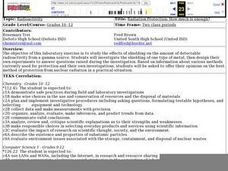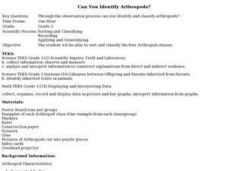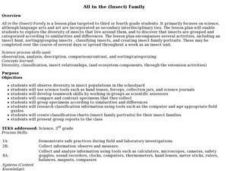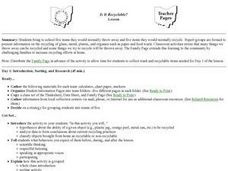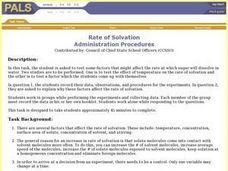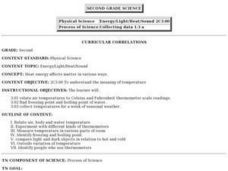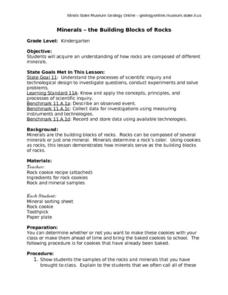Curated OER
RADIATION PROTECTION: HOW MUCH IS ENOUGH?
Young scholars study the effects of shielding on the amount of detectable radioactivity from a gamma source. They investigate the shielding of one type of metal, then design their own experiments to answer questions raised during the...
Curated OER
Teaching About Magnets in Kindergarten
Students explore magnets through the five lessons of this unit. The everyday uses of magnets and an awareness of magnetic attraction form the basis of the skills presented in these lessons.
Curated OER
Can You Identify Arthropods?
Third graders sort and classify the four Arthropod classes. They are given puzzle pieces of one Arthropod example. Each group is to put their puzzle together, glue it on a piece of construction paper and label the ir puzzle.
Curated OER
All in the (Insect) Family
Students participate in a series of activities in order to explore the diversity of insects. They explore how insects are grouped and categorized.
Curated OER
Is It Recyclable?
Students bring to school five items they would normally throw away and five items they would normally recycle. Expert groups are formed to present information on the recycling of glass, metal, plastic, and organics such as paper and...
Curated OER
Impact Craters and Water on Mars
Pupils explore for water on Mars using impact crater morphology. During this lab, students: investigate how to use the equation writing and graphing capabilities in Microsoft Excel, then develop and apply an impact crater depth-diameter...
Curated OER
Spider Poems: The Spider and the Fly
Students review the information they gathered on different websites to write a poem about spiders. They use other websites to gain more information if needed. They share their poem with the class.
Curated OER
Deliver
Students measure the mass, volume, length and area of various objects. They are assigned a letter. The task is assesses students' abilities to make simple observations and measurements.
Curated OER
Instruments and Measurement
Students circulate through stations to determine the proper instrument to make a certain type of measurement. They must make measurements of mass, volume, length, area, electrical current, temperature and force.
Curated OER
Water Quest
Students visit the Hydrology Study Site, conduct a visual survey to discover info about local land use and water quality, and document their findings by mapping the water body. They use this investigation to raise questions for further...
Curated OER
Water Walk
Students follow the appropriate sampling protocol and take two measurements of a local water source. These measurements are Transparency and Temperature. This info about local land use and/or water chemistry issues may require further...
Curated OER
Learning From Leaves: A Look at Leaf Size
Students measure and analyze leaves from various environments. They discuss the environments, and make inferences about environmental variables that could have contributed to the differences in leaf size and texture.
Curated OER
Observing Objects
Students observe the motion of both a pendulum and a spring pendulum . They then explain the differences and the similarities between the two types of motions.
Curated OER
Vitamin C Testing
High schoolers determine which of three beverage samples contains the most vitamin C. They then apply their knowledge to an additional situation. Students use beverages that have a large, definite difference of vitamin C content to...
Curated OER
Rate of Solvation
Students test factors that may affect the rate at which sugar dissolve in water. They conduct two studies: One is to test the effect of temperature on the rate of solvation and the other is to test a factor which Students come up with...
Curated OER
Boyle's Law
Students work in small groups and use a hand-held vacuum pump with a balloon under the dome with some air. Another deflated balloon is attached to the end where the air goes out. As the air is drawn out of the dome the first balloon with...
Curated OER
Heat Energy- Temperature
Second graders investigate the meaning of temperature. They determine what happens to a thermometer when the temperature rises or falls. They place thermometers in different classroom locations in order to compare the temperature in a...
Curated OER
Black Hole Lesson
Tenth graders experiment with detection techniques for black holes by modeling the rotation of galaxies with larger and larger masses in the center. They discover while some events cannot be directly observed they may be observable in...
Curated OER
BIRDS OF A FEATHER
Students observe and identify characteristics of artifacts and fossils; explain how artifacts and fossils are used to explore the past; and identify ways that Native Americans prepared food and made tools
Curated OER
Minerals- the Building Blocks of Rocks
Students investigate how rocks are composed minerals by dissecting rock cookies.
Curated OER
Floating Pencil
Students discover how salt water makes a pencil float better than freshwater by measuring and comparing the lengths of the portion of the pencil that floats above the water surface. They then determine if an unknown water sample is...
Curated OER
Major Functions
Seventh graders investigate the basic characteristics and needs of living things. They identify the major parts of plants and animals by making lists. Students focus upon one living thing and speculate how if one part is changed how it...
Curated OER
Using a Thermometer
First graders use their senses to formulate questions and make predictions to determine what is in the "Wonder Bag". They hold pieces of ice and examine while listing descriptors on a chart and then take their own temperature using an...
Curated OER
Fraction Equivalence
Fourth graders explore fractions. They compare different fractions using fraction bars. Students find equivalent fractions and they use fraction bars to visualize addition of fractions.


